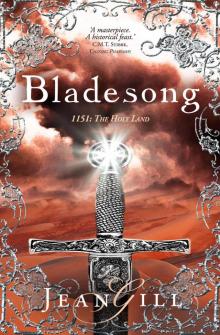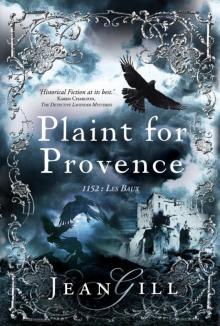Plaint for Provence Read online
Page 6
‘My physician, Malik, told me that you had some expertise in women’s matters.’
The mention of her friend and mentor softened Estela’s instinctive denial to mere prevarication. ‘Nothing compared to his own, my Lady.’ She had to strain to hear Petronilla’s words, spoken as if to the blue skies through the window.
‘There are things only a woman can understand. Not just of the body. And Malik said you could be trusted in this.’
In this. But not in everything. Not when she was Lady Etiennette’s troubadour. It was Estela’s turn to flush but Malik had indeed taught her something of his profession. ‘I have helped some women with their troubles,’ she admitted, ‘and the practice of medicine carries the seal of the confessional, beyond politics and beyond morality.’
Petronilla’s cross glinted as she kissed it and let the chain drop back onto the tiny jut of her breasts. ‘There is no immorality, beyond the sins we cannot escape of being mortal and a woman.’ She turned to face Estela, sat down in the carved chair and motioned her guest to take a stool. Another of Malik’s lessons had been to know when to listen and when to question, whether learning to play Arabic chords on al-oud or waiting for a patient to tell you what she needed to say. After that, you might be able to find out what you, as a doctor, needed to know.
So Estela sat and schooled her face to sympathy, which needed less acting with every new observation she made of her unexpected patient. Tiny, that jut of breast might well be, but Estela divined that it had grown recently, as, no doubt, had the belly invisible beneath the modest folds of a drab gown. Someone as experienced in midwifery as Estela recognized the small signs.
In childhood, she’d accompanied her mother often enough; as an adult she’d learned from a midwife in Die, from Malik and from the precious books he sent. Most telling experience of all, she’d given birth herself, lonely and ill-attended. She reminded herself that this was the usurper and tyrant but there was no longer any bite to the words. This was a girl asking for help.
‘I think I’m with child,’ Petronilla confirmed, stuttering, colouring up. Drawing her black brows together, she looked as if she’d just confessed the worst of sins instead of happy tidings. ‘It is a blessing on our marriage.’ The frown lines deepened and her confession was spoken so low that Estela had to guess some of the words. ‘But I don’t know whether I can do it.’
Set-faced, she added, ‘You need not worry for the succession. I know my duty and I wrote my will as soon as I knew. It is clearly written in my hand, with witnesses, in April of this year, on the Day of St Isodore, that if I should die in childbirth, my husband is heir to Aragon. I think this will happen, that I shall die instead of giving him a baby.’
Estela spoke softly, as to a wounded animal stranded on a cliff edge. She unreeled the safety line, word by word, testing the reaction as she went. ‘You are not alone, not in your fears nor in your questions…’
She caught the flicker in Petronilla’s eyes and continued, ‘You sense the changes in your body…’
Another flicker. ‘Your mother told you what would happen but you want to know more?’
A direct hit. Petronilla’s eyes filled with tears and her fists clenched, white, but her tone was even, without bitterness, as she stated the facts in her oddly accented Occitan.
‘My mother left for the peace of a nun’s life at Fontrevaux, when I was three, and my father returned to his beloved abbey at the same time, having betrothed me to Ramon. They are saintly people, who did their duty by Aragon and conceived an heir.
They were too pure to commit mortal sin a second time in hope of a boy. They left me affianced to the best husband any woman could hope for and he has taken care of me, waiting the twelve years until my flowers came and he could marry me.
Now it is our turn to make the heir I was born for, the reason my father renounced his vow of chastity and put Aragon before God. This baby will be the king who unites Barcelone and Aragon and I am afraid of my body’s weakness and of my ignorance of motherhood. I have sinned too much to be allowed motherhood.’
‘I understand how important the baby is.’ And guessed at what Petronilla’s upbringing had lacked. Saints for parents were all very well in theory. ‘How can I help you?’
The girl - for so Estela now thought of her - turned wide brown eyes on her saviour. ‘I need a potion to stop me becoming fat so that the angels will bring me a baby boy. I am fasting and praying but still my impurity swells.’
Carefully, Estela asked, ‘You know how babies grow?’
Petronilla gave a nervous giggle. ‘Of course. Ramon explained it all to me on our wedding night. He sowed seeds in my garden then we prayed together that the angels would give life to a boy seed and bring it to me to show the world that we have done God’s will in our marriage bed.
But I am afraid that my sins have offended the angels and they have sent me this sign, this fatness, to show me I must be better or they will take my life instead of giving me the baby. I know this happens to sinful women.’
Even more carefully, Estela ventured, ‘And what made you think you were with child.’
‘That was easy.’ The smile was assured this time. ‘My flowers did not come, which means that the angels are growing a seed for me, even if they wait till I am worthy before bringing me the baby.’
‘Have you talked to your Lord about this?’
Again the knotted brows and twisting hands. ‘I can’t. I am a woman now, not a child, and these are women’s matters.’ Very quietly she added, ‘And the Church teaches us how sinful women are. What if the angels won’t bring me the baby? Ramon has waited twelve years for this. What if I let him down? I can’t bear it!’
You will have to bear it, my sweet child, thought Estela, two years and a baby older than the girl in front of her. To become a mother, you will indeed have to bear it, one way or another. How could a girl grow up so ignorant? But Estela knew the answer to that, having lost her own mother so young. Questions that couldn’t be asked or had mysterious answers, whose sense was misunderstood.
How was she to untangle the dangerous innocence facing her? She remembered her mother, fighting to save women’s lives as they quoted the bible against her interventions. ‘Work with their beliefs, not against them.’
Taking a deep breath, Estela chose her words. ‘We women all know these fears but God is merciful, and you can see from the babies all around you that the angels forgive us too. They know what we must risk and suffer to give life; that is our penance and the root of our joy.’
Petronilla paled. ‘Risk and suffer?’
‘The angels have done their work and have already brought life to Ramon’s seed.’ She hurried to answer the unspoken question before further confusion side-tracked her explanation. ‘But we women have to grow the baby ourselves, in our gardens. The fatness is your baby growing.’
‘No!’ Petronilla’s horror was instinctive. ‘Get it out! I want someone else to look after it!’
‘No-one else can grow your baby. This is motherhood. This is God’s preparation for the love you will feel.’ Estela only hoped that this would be true. Growing up with saints as parents was difficult enough but being married to one must complete the feelings of inadequacy. She sent silent thanks to her own mother, for the open-eyed preparation for what human beings really did, in work and play.
‘What do I have to do to make the baby come out?’
‘Grow. How many flowers have you missed?’
‘Three.’
‘Then the baby must grow until All Souls’ Day to be complete. He will be ready to come out then.’ There was no avoiding the inevitable question.
‘How will he come out?’
Estela prevaricated. ‘First you must nurture yourself for both your own and the baby’s sake. No more fasting. There are many ways of helping your body carry its burden.’ Estela sifted her recent learning and found suitable advice from Hildegard von Bingen.
‘When your body gets heavy and you feel tired,
the mushroom of the beech tree should be taken fresh, cooked with good herbs, boiled in water until broken down and strained through a cloth. A broth from this juice with lard added should be taken twice a day after eating and you will find ease. There are many herbs to help in growing a baby and also some to avoid.’
Estela had known as many women keen to lose their baby as to keep it, often when there were already more mouths to feed than was possible. Keeping a baby was more difficult to guarantee and accepting that, however precious the baby might be to the fate of two kingdoms, was only one of the hardships Petronilla faced. There were however ways to improve the odds.
‘There are some herbs to avoid, such as goatsbeard - I will give you a list and you should make sure a trusted servant keeps these out of your food or drink.’ Estela remembered only too well an attempt on Aliénor’s unborn child, while the Queen of France stayed in Narbonne. ‘In the seventh month, your healer should mix powder of frankincense, oil, wax and mastic and anoint you front and back.’ Trota’s methods could be trusted but were not for the poor. ‘Malik knows all this,’ she tailed off lamely.
Petronilla had not been diverted. ‘How will the baby come out?’ she repeated.
‘Your garden is called the womb by physicians. It will stop its wandering around your body to grow the baby in your belly.’ Petronilla winced at the crudeness and had opened her mouth to ask the question a third time when Estela beat her to it. ‘And the angels will help you open your garden gate wide for the baby to come out, the same way the seeds entered.’
There was a shocked silence as Petronilla took in what this meant. ‘This is what I must do to make an heir for Aragon and Barcelone? And for Provence, in case my nephew should die?’
It was Estela’s turn to wince. She’d forgotten that this was the enemy. Time to think about that later. ‘Yes, this is what you must do.’
‘You did it.’
‘Yes.’
‘And you gave birth to an heir for your husband.’
‘I gave birth to an heir.’ The wound that would never heal ripped open again. What was Musca’s status in the eyes of the world?
Still pale, Petronilla stuck out her jaw and asked, ‘How can I make sure it’s a boy? Ramon made sure we chose the most propitious time and he prayed beforehand to be sure that he would pass on only virtue to his son but I am just a woman and not worthy. I tried to keep my thoughts pure but,’ she whispered, ‘there was pleasure at the conception. There must be some way I can atone.’
Estela shook her head, biting her tongue so as not to challenge the church teaching that pleasure was wrong. Work with their beliefs. She explained that there were measures Petronilla could take before and during conception but that afterwards all she could do was to balance the female hot and male cold elements with diet and herbs. There was no point worrying Petronilla even more by telling the truth, that even with proper preparation for the seed, some women could only grow girls. Aliénor was likely just such a one, having produced only two girls.
Although many would blame the sinfulness of the marriage itself, in being too close a relation, Estela favoured the more scientific explanation. However, Petronilla had been given more than enough truth for one day and if she bore a boy, that question was answered.
Estela had some uncomfortable rethinking of her own to do. She could no longer join in wholeheartedly with Sancha’s diatribe against the usurpers. From loyalty to her host Etiennette and from long friendship with Sancha, she found Petronilla’s husband guilty of all charges, including the intimacies of marriage.
Chapter 6
Steel (calybs) is very hot and is the very strongest form of iron. It nearly represents the divinity of God, whence the devil flees and avoids it. If you suspect there is poison in food or drink, secretly place a hot piece of steel in moist food, such as broth or vegetable puree. If there is poison present, the steel will weaken and disable it.
Physica, Metals
‘Les Baux - people find it impressive the first time they see it!’ Hugues declared loudly, as he halted to allow Dragonetz the splendour of the view.
‘Indeed.’ Dragonetz grinned. From the broad southern approach, the château still seemed part of the rock, a hazy illusion, but the view did not catch your breath like looking down across the valley from the Col du Sarragan.
They’d blown trumpets and hunting horns loudly enough to wake the creatures rumoured to lurk in the Val d’Enfer and certainly enough to wake everyone in the château, judging by the welcome party Etiennette sent to accompany her son and his men on the last stretch of their return home. Hugues and Dragonetz played to their new audience, much to the amusement of Hugues’ men.
The eastern gate was already open for them and a scattering of townsmen had paused in their business to cheer their lord home. Hugues rewarded them with a handful of alms and glared at the man in his band, who muttered, ‘Moorish gold, I bet.’
By the time they reached the castle, the gate was raised there too and a line of nobles awaited them, as they dismounted. Men and horses went to their respective lodgings and Hugues threw himself to his knees before a small woman in a grey wimple and widow’s black. Dragonetz followed suit, pressing his lips to the hand offered him, a hand mottled with age and more manual work than was customary for the lady of such a house.
‘My Lady des Baux,’ Dragonetz confirmed, looking up at a face lined with old worries and eyes that could not hide a plea. Younger, Etiennette might have had vivacity but she had never been a beauty and there was a solidity to her now, in both physique and manner, that spoke plain.
‘Courtesy will serve in the banquet-hall my Lord Dragonetz but you know why you’re here and time is short. Are you with us?’
Dragonetz held her gaze. ‘I serve Provence,’ he told her. ‘And I like your son.’
Her mouth pursed in disappointment but all she said was, ‘Then that must do for now.’ She raised him and included those around her with a gesture. ‘Let me present my court to you. Our special guests, the Comte de Barcelone and his lady, are resting after their journey, which was not without incident -’ A suspicious glance at her son was met with an innocence that Dragonetz suspected had been perfected to hide stolen cakes and kisses during Hugues’ growing-up years, if his own experience of mother-son relationships was anything to go by.
Dragonetz concentrated on the names of those being introduced to him. D’Uzès, Châteaurenard, de Saint-Rémy…
Etienntte murmured, ‘I believe one or two of the jewels who adorn my château are known to you already…’
‘Lady Sancha,’ murmured Dragonetz, bending low over a large-boned, impeccably manicured hand half-covered in peach silk, a colour that was not flattering to the over-rouged complexion of its wearer. The knight could not have cared less about her appearance or what lay beneath; their friendship was a rare treasure from the Holy Land.
‘My dear boy, it is good to see you again. But you shouldn’t be here, you know. Of course you know.’ Another pair of worried eyes. If Dragonetz had not already known of the tensions in Les Baux, he would have realized now.
He just nodded and squeezed that big hand. ‘I have some brocade for you, from Damascus. When you can spare the time to select some.’
‘Ooh,’ she squealed, all feminine avarice. ‘What colours?’
‘I thought the emerald would appeal.’
Her eyes lit up. ‘I find myself at a loose end this very afternoon,’ she told him.
Dragonetz bent over her hand, as if pressing his lips to it and murmured, ‘Then we shall make up for lost time, my Lady.’
‘Naughty tease,’ she twitted him, pulling her hand away, as someone else joined the assembly, in a rustling of gown and joyful yelp of dog. A horribly familiar yelp of dog. Lady Sancha said, ‘I was going to warn you…’ just as Dragonetz straightened in time to avoid being bowled over by something big, white, furry and yes, definitely familiar. ‘Nici,’ he said with resignation, as the dog presented an ear to be scratched then shambled
off, having done his duty.
‘I believe you two know each other,’ said Etiennette des Baux as she presented Dragonetz to the latecomer, a tall beauty with tawny skin and green-gold eyes, strands of raven hair slipping out of her demure linen coif. The baby in her arms gurgled on seeing Dragonetz and said ‘Icky’.
‘My Lord Dragonetz.’ She curtseyed one-handed, the other holding the baby…
‘My Lady Estela.’ He bowed over her hand. She was married. But not to him. What on God’s earth she was doing here at all he had no idea until the Lady of Les Baux enlightened him.
‘We are honoured that Lady Estela de Matin accepted the invitation to perform for our guests during the stay of the Comte de Barcelone. As we are honoured that you accepted our invitation too. I believe you have sung together. Perhaps you will do so for us?’
‘Perhaps,’ said Dragonetz between gritted teeth at the same time as Estela commented brightly, ‘Quite a coincidence.’
He looked at her, unable from courtesy either to throttle her or take her in his arms, and knowing from the laughter in her eyes that she could read his thoughts. She should have been at home, safe!
‘It seems I wasted a good pigeon,’ he told her.
‘You always over-rated home-loving birds,’ she teased.
‘Now I think on the matter, I have something new in mind that would suit your voice, my Lady. Perhaps we should sing together.’
No-one else would have caught the spark of desire but he did as she replied, ‘Perhaps we should, my Lord. I look forward to something new.’
‘Hussy,’ he whispered, as he bent over her hand in leave-taking. Her smile warmed him throughout the necessary practicalities of the day before he could slip through the sleeping château to her bedchamber and punish her as they both deserved.

 Queen of the Warrior Bees
Queen of the Warrior Bees Song Hereafter
Song Hereafter Someone to Look Up To
Someone to Look Up To Bladesong
Bladesong How Blue Is My Valley
How Blue Is My Valley Plaint for Provence
Plaint for Provence Song at Dawn: 1150 in Provence (The Troubadours Quartet)
Song at Dawn: 1150 in Provence (The Troubadours Quartet)